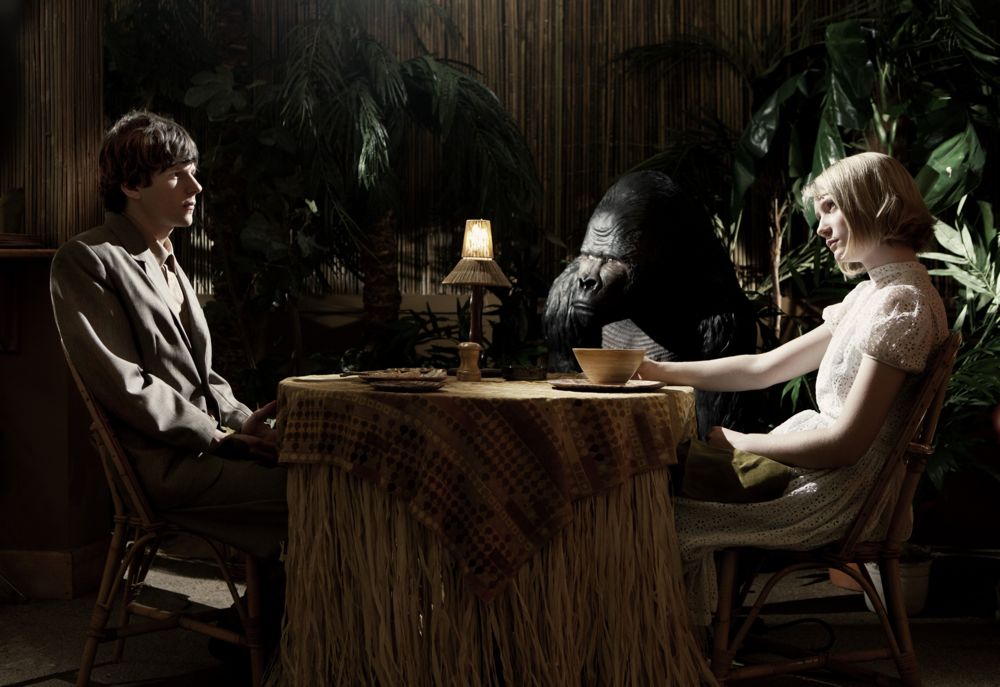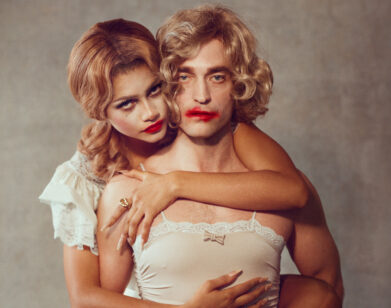Richard Ayoade and Jesse Eisenberg on Dostoyevsky and Doppelgängers
Richard Ayoade’s dark comedy The Double is making the festival rounds: first at Toronto in September and now at the Sundance Film Festival. The stylized and nightmarish film is about a young man whose interloping doppelgänger shows up at his workplace and attempts to usurp his life. It stars Jesse Eisenberg (The Social Network) playing, in the most literal sense, opposite Jesse Eisenberg. Based on a novella by Dostoyevsky, humor, the surreal, and excellent acting drive the narrative through a beautifully crafted dystopia untethered to any specific time or place. The film is directed and co-written by polymath Ayoade, who is also an actor (The IT Crowd), comedian, and Cambridge graduate. He and Eisenberg brought cerebral charm to the film’s Sundance premiere as they playfully answered questions from the audience in a dynamic that can only be described as ridiculously cute. The director and star subsequently sat down with Interview to talk about the film and learn new things, like what the heck “Manichean” means.
DEENAH VOLLMER: Hey, it’s an honor to meet both of you. Richard, I became familiar with your work last night at the film premiere. Jesse, you’re my longstanding celebrity crush.
JESSE EISENBERG: Really?
VOLLMER: Yeah. I tried to talk to you at The New Yorker holiday party, but I was cock-blocked by Aziz Ansari.
EISENBERG: Really?
VOLLMER: Yeah.
EISENBERG: I wonder how many people right now in the world are saying something like that.
VOLLMER: I don’t know, several? You guys were very charming at the Q&A last night. Do you get nervous debuting the film for new audiences?
RICHARD AYOADE: I feel resigned more than nervous. With a live performance, you feel nervous because there’s a sense it could do well or badly based on how well you are performing, whereas the only variable with a film premiere is technical, which invariably you have very little control over, whether the sound is good, whether the acoustics of the room are good. Unless you follow a Kubrickian policy of phoning every theater in the world and make sure their walls aren’t painted in gloss, you have to let that go.
VOLLMER: And you, Jesse, have never seen the film?
EISENBERG: No.
VOLLMER: Is that weird?
EISENBERG: Yeah, it’s a very strange experience to watch yourself in a movie anyway. I most frequently don’t do it, but if I was going to do it, I would do it in a private way, not at a public screening at a film festival, which is just an overwhelming experience.
VOLLMER: Feeling scrutinized by people watching you watch the film?
EISENBERG: Yeah, I suppose so. And the experience of making it is so vastly different than the final product, so you inevitably feel alien to it.
VOLLMER: Tell me about playing two characters at once.
EISENBERG: It’s a really unique acting opportunity to play two roles who are not only interacting with each other, but vastly different. But even more interesting was the opportunity to work with Richard because he has a way of working with actors that makes everyone on set feel really creative. Most movie characters are a prescribed set of behaviors that have already been determined and written, and the filming of the movie is usually just to account for those things. Whereas everyone on this movie, even if they were only there for one day, felt they were not only being creative, but creating something new. It’s very evident in his first movie (Submarine, 2010) and I imagine in this one. I saw that every character was dealt with so uniquely, even if they were doing things you’ve seen before, like falling in love. It felt very specific and real. That’s how it felt on The Double, the scenes that you felt were part of the human experience, like having a boss who ignores you, just felt totally unique and made all the actors feel like we were working to the best of our abilities, which is just rare.
VOLLMER: That came across. Richard, was that part of your guiding philosophy as a director?
AYOADE: Well, the most interesting part of filming is what the actors do. That’s the primary link between the story and the audience. You want each actor or character to be as thoroughly investigated as you can, and give everything its best case. Generally, I’ve always felt that actors in my experience have a very good and accurate instinct about whether something feels right or not. They just have a sense because they have to literally do it.
VOLLMER: Do you relate to this feeling of split personalities?
AYOADE: I definitely think people aren’t one thing, but I’m not Manichean or anything and it’s important to be on the record as such.
EISENBERG: What’s that?
AYOADE: Someone who believes the world is divided into good and evil. I think people have the capacity to be many different things and many seemingly contradictory behaviors; and in the Dostoevsky story, “The Double” is almost a metaphor. It predates Jung and Freud, the Jungian idea that the shadow is all the things you can’t accept about yourself, or in extreme cases you create this other entity that does all the things you don’t admit you would like to do.
EISENEBERG: Manichean? This is a philosophy?
AYOADE: It’s more of a concept, an idea. Is this going to be in the caption on the photo when this is published, “I’m not a Manichean”?
VOLLMER: I’ll try to make that happen. I’m interested in the conditions under which you think you create your best work?
AYOADE: I guess in some ways I don’t feel it’s my work in that proprietorial sense. I don’t know. I think there are so many variables that it’s impossible to say. Something you do regularly, you get better at doing it.
EISENBERG: I try to write every day. Sometimes the things come out well, and sometimes they don’t. When they come out well you think, Wow, I must be really great; and when they come out poorly, you think you must be terrible, but the truth is that’s how any process works. If you are prolific at something, or work at something, sometimes it will be good and sometimes it won’t. When we were doing this movie, because there was such strong momentum because I was playing two characters and I didn’t have any real downtime, it created, at least for me, a feeling of satisfaction for what I was doing. But it’s rare to find a movie like this, obviously. It’s rare to find a movie that offers not only two characters, but where both characters are emotional. Since this had that, I felt unusually busy and therefore like the opportunity for doing well was greater. When I do plays in New York and do eight shows a week, you have the same feeling. Three of them are terrible, four of them are okay and one is really good. It’s hard to say what accounts for the really good one or for the terrible ones, but you end up trying to remanufacture whatever worked for the good one, like eating a tomato. I ate a tomato and the show was good, but that of course is not how it works.
THE DOUBLE WILL BE RELEASED BY MAGNOLIA PICTURES THIS SPRING.
For more from Sundance 2014, click here.







